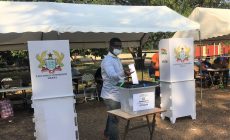Dogs eating corpses of Ebola victims in Liberia
- Posted on
- Comment
 Dogs are digging up the corpses of Ebola victims buried in shallow graves in Liberia and eating them in the street, villagers have claimed.
Dogs are digging up the corpses of Ebola victims buried in shallow graves in Liberia and eating them in the street, villagers have claimed.
Furious residents of Johnsonville Township, outside capital Monrovia, raised the alarm after packs of wild dogs were spotted digging up corpses from a specially-designated ‘Ebola graveyard’, dragging them into the open and feeding on their flesh.
The grisly scenes came three weeks after government health officials – desperate to stem the country’s rising infection rate – hurriedly buried the bodies despite a heated standoff with villagers who refused to give their permission to use the land.
But rather than resolve the dispute, Liberia’s Ministry of Health burial team dug the graves at night to avoid further confrontation, making the infected bodies easy targets for scavengers, villagers say.
Now fears are mounting that the dogs – which cannot grow sick from the strain of Ebola running rampant through West Africa but can carry it – will be able to pass it on to humans through licking or biting.
‘We are very disappointed in the Health Ministry, especially the government that took an oath to defend and protect us,’ Alfred Wiah told The New Dawn. ‘To see them act in such manner is unacceptable and we’ll never allow the government come to bury any longer.’
He added: ‘They will be resisted by us because I think the government has failed to protect us. Why bring Ebola bodies and not bury them well?’
While the dogs are unlikely to grow sick from the virus, there is a strong chance they could still pass it on to humans, Dr. Stephen Korsman of the University of Cape Town’s medical virology division told News 24.
‘[The dogs’] infections appear to be asymptomatic,’ he said. ‘This means that dogs won’t get sick, but they still could carry a potential risk through licking or biting.’
The news comes as it was revealed the killer disease has reached Senegal, making it the fifth West African country to be affected by the outbreak.
The country’s Ministry of Health said a man infected with Ebola traveled to Senegal, bringing the disease to that country for the first time in an outbreak that has hit four other West African nations and killed more than 1,500 people.
Health Minister Awa Marie Coll Seck told reporters that the infected person, a university student from Guinea, sought treatment at a hospital in Senegal’s capital, Dakar, on Tuesday but gave no indication he might have Ebola.
The next day, an epidemiological surveillance team in Guinea alerted Senegalese authorities that they had lost track of a person who had had contact with sick people. The team said that the person disappeared three weeks ago and may have come to Senegal.
The student was tracked to the hospital in Dakar that same day and was immediately quarantined, Seck said.
A test has confirmed that he has Ebola, and the World Health Organization has been alerted.
And in a further blow to the fight against the outbreak, scientists today claimed the Ebola virus disease is rapidly and continually mutating, making it harder to diagnose and treat.
A study of the initial patients diagnosed with the virus in Sierra Leone revealed almost 400 genetic modifications.
And it could be detrimental not only to current treatments, but also to future vaccines that are in the works.
The team of researchers, led by the Broad Institute in Massachusetts and Harvard University, analysed more than 99 Ebola virus genomes.
Also today, the World Health Organization revealed that the past week has seen the highest increase of Ebola cases since the outbreak in West Africa began.
The U.N. health agency warned yesterday that the outbreak in West Africa is accelerating and could eventually infect as many as 20,000 people.
So far it has killed more than 1,500 of the 3,000 people it has sickened in Guinea, Liberia, Nigeria and Sierra Leone, according to an official count.
The U.N. health agency said yesterday it assumes that in many hard-hit areas, the actual number of cases may be two to four times higher than is currently reported.
In a detailed report on the outbreak published today, the WHO said more than 500 cases were recorded over the past week, by far the worst toll of any week so far.
The vast majority of the cases were in Liberia, but the agency said it was also the highest number of cases in one week for Guinea and Sierra Leone. Nigeria has also recorded a small number of cases.
Dailymail.co.uk










 (Selorm) |
(Selorm) |  (Nana Kwesi)
(Nana Kwesi)